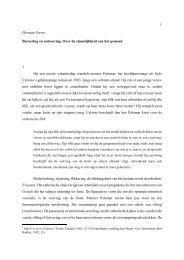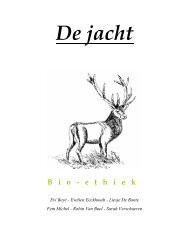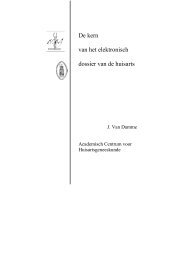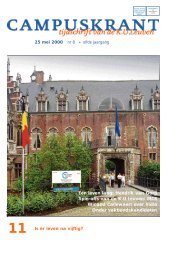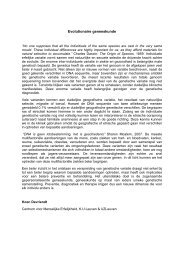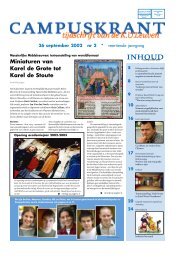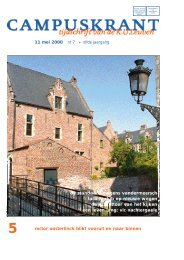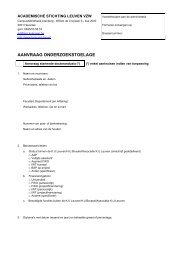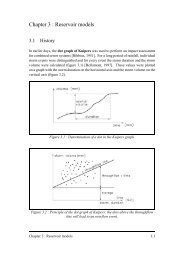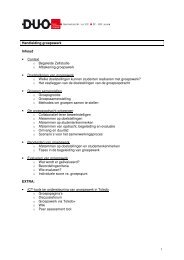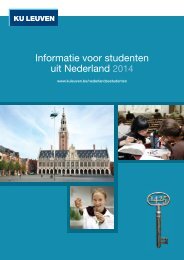EQUALITY GUIdE - KU Leuven
EQUALITY GUIdE - KU Leuven
EQUALITY GUIdE - KU Leuven
You also want an ePaper? Increase the reach of your titles
YUMPU automatically turns print PDFs into web optimized ePapers that Google loves.
Chapter 2 ! Career paths: recruitment ! promotion ! dismissal 91<br />
women (41%) than men (18%), the previous part of the survey showed that students<br />
label the atmosphere at Ghent University as friendly rather than competitive. The study<br />
‘Wetenschap tussen roeping en beroep’ 96 also postulates that the competition between<br />
colleagues is one of the main causes of the early outflow at universities. The low percentage<br />
of students who regard the competitive aspect of an academic career as a<br />
disadvantage can be explained by the assumption that most students underestimate<br />
the rivalry between scientists. Consequently, it only becomes a negative factor as one<br />
climbs the academic ladder. Finally, the respondents consider neither the income nor<br />
the lack of recognition as major obstacles.<br />
The last part of the survey focuses on the representation of scientists. The respondents<br />
had to indicate to what extent they agree with a list of (positive and negative)<br />
characteristics. More than 90% of the respondents label scientists as passionate, enthusiastic,<br />
intelligent, ambitious, immune to stress and efficient. As became apparent from<br />
previous data, most students seem to believe that scientists earn high wages. The<br />
image of the male scientist in an ivory tower no longer applies. Only 11% of the male<br />
and 17% of the female students consider the practice of science as a purely male activity.<br />
Furthermore, according to the respondents, scientists are anything but unworldly<br />
since they keep abreast of topical matters. Scientists are also seen as leaders rather<br />
than team-players. Notwithstanding the apparent unanimity about a scientist’s characteristics,<br />
the male respondents prove to have a somewhat more positive image. Thus,<br />
more male than female students assign characteristics such as flexibility and creativity<br />
to scientists. Although female respondents have a positive image of scientists in general,<br />
they describe scientists more often as boring, grave people with a high ‘nerd’<br />
level. The most striking and significant gender difference is that 31% of female and<br />
only 18% of male respondents believe that scientists have to sacrifice a lot of their<br />
social life in general and family life in particular to succeed in their job. Quite contradictorily,<br />
at least 95% of the respondents picture a scientist as a man or a woman with<br />
children.<br />
2.5. Conclusions and recommendations<br />
2.5.1. General conclusions<br />
The results of the survey largely correspond to the findings of the research on PhDstudents<br />
97 and the study ‘Wetenschap tussen roeping en beroep’ 98 . In contrast to the<br />
students questioned in the study ‘Wetenschap tussen roeping en beroep’, the students<br />
at Ghent University believe that scientists earn high wages. Consequently, this is expe-<br />
96<br />
97<br />
98<br />
De Gier et al. (2001), op. cit.<br />
Verlinden et al. (2005), op. cit.<br />
De Gier et al. (2001), op. cit.



